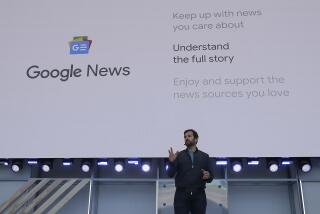NEWS ANALYSIS : Long-Distance in Sight of Baby Bells : Telecommunications: But reform bill has stalled over the issue of concentration of media ownership.
- Share via
WASHINGTON — Ever since they were formed by the 1984 breakup of the old AT&T;, the Baby Bell telephone companies have been itching to move beyond the local territories they were created to serve and get into the lucrative long-distance business.
And after years of litigation and Byzantine legislative efforts, the tentative agreement reached Thursday on a crucial piece of the sweeping telecommunications reform bill would finally let them do just that. It would also put an end to the local monopolies the Baby Bells still enjoy in most areas, requiring them to open their markets to competitors.
Congressional negotiators made no progress Friday in resolving a dispute over media concentration, the final obstacle to the bill.
But if it’s passed, analysts say, the legislation could usher in some sweeping changes in telephone service within the next 18 months. Consumer advocates say local phone rates may go up in the short term; industry observers say a host of new choices and services for residential and business phone customers will become available.
And the new law may also set off an acquisition spree by the regional Bell companies as they seek to expand their reach.
None of that will happen unless Senate and House members can reach agreement on media concentration. Negotiators from both chambers ended their fifth meeting in as many days Friday without agreeing whether to alter rules governing ownership of mass media outlets such as cable TV, radio and television stations.
“Right now the biggest problem is with broadcast,” Sen. Larry Pressler (R-S.D.) told Bloomberg Business News. “It could be a showstopper.”
Sen. Ernest F. Hollings (D-S.C.), whose views are close to those of the White House, did not attend Friday’s meeting, and aides indicated that Hollings and the White House are upset with Republicans’ insistence that federal rules be relaxed to allow companies to amass more media properties.
“There’s a lot of distance between us,” said a Senate aide close to Hollings.
“The Republicans just won’t compromise,” said a House aide who was briefed on Friday’s meeting.
Hollings and the Clinton administration want House conferees to modify a nine-page amendment they offered Wednesday that would abolish the cable TV and broadcast cross-ownership rules, allow broadcasters to own more than one TV station in a single market and also allow them to own a group of stations that reach more than 35% of U.S. households.
They say such media concentration would thwart political discourse, curtail the diversity of viewpoints and hurt news coverage of events or issues in which media conglomerates have a financial interest.
In Los Angeles, for example, the region’s 93 broadcast television and radio stations are owned by 78 separate entities. Under the proposed House legislation, the number of owners could be reduced to as few as 10.
The issue of media concentration is holding up support for the bill from lawmakers and consumer groups that want telecommunications reform to bring greater competition to all aspects of the communications industry.
“We continue to oppose this bill even though it opens up the local, long-distance and cable markets,” said Gene Kimmelman of Consumers Union, “because at the same time, it is allowing the most likely competitors to merge or form alliances that are likely to block the development of widespread competition.”
Executives in the long-distance industry, who say the language of the compromise released by House negotiators Friday is much more favorable to the regional Bell companies, may privately be hoping the question of media ownership remains unresolved and thus kills the legislation.
“We’ve been told things verbally that never panned out on paper,” said Jim McGann, a spokesman for AT&T.; Expressing frustration with incremental twists and turns of negotiations, McGann added, “It would be nice for a bill that would affect 14% of the American economy to at least be” public 24 hours before it is voted on so it can be given full scrutiny.
But analysts said consumers will benefit as long-distance firms move quickly to offer discounts on a package of services, including local, toll and long-distance calls and other services such as electronic and voice messaging and wireless services.
“In the post-telecom reform world, you’ll see new services packaged around new area codes and new intelligence in the network,” said Dennis Miller of Opus Research in San Francisco.
“Right now the long-distance carriers are farther along in developing such offerings, but the local exchange carriers are going to look around and say, ‘Well heck, I have to open up my switches, I better hustle like mad to come up with services that are at parity.’ ”
Several analysts also noted that the Bells may search for partners to help them broaden their reach. Potential targets could be LDDS and Frontier, two lesser-known long-distance carriers, or even Sprint or MCI.
One service the regional phone companies must provide to gain entry to the long-distance market would enable customers who move within a region or switch phone service providers to keep their phone numbers.
Pacific Bell, which expects to lose market share in its local business but regain it through long-distance and other services, hopes to be in the long-distance business within a year from the time the telecommunications legislation is passed.
The company, which provides local service to much of California and parts of Nevada, is planning a direct-marketing campaign to compete in the notorious marketing war among AT&T;, Sprint and MCI.
“For the first time, we’ll be able to offer the customer a complete solution,” said Phil Quigley, chairman of Pacific Telesis Group, parent of Pacific Bell. “The result will be the ability for us to offer our customer who might have 200 minutes of combined local, toll and long-distance a package discount on that, compared to the 75 minutes that they make only in our market today.”
More to Read
Sign up for Essential California
The most important California stories and recommendations in your inbox every morning.
You may occasionally receive promotional content from the Los Angeles Times.













